Can Cats Eat Honeydew? Does it Have Real Benefits?
Can cats eat honeydew melon? Yes, honeydew melon is non-toxic to cats, according to the ASPCA animal poison control. This juicy and sweet fruit makes an excellent treat for cats during the hot summer months. Its fleshy meat is packed with moisture and nutrients that will be discussed below.
Is honeydew safe for cats?
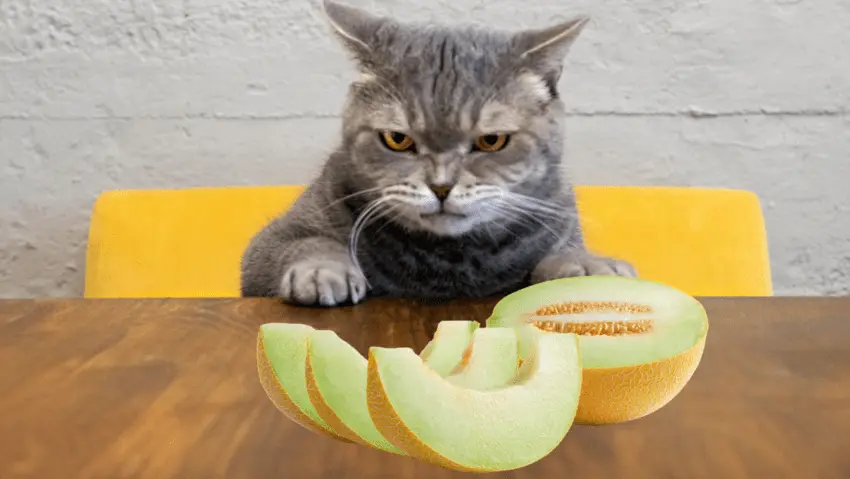
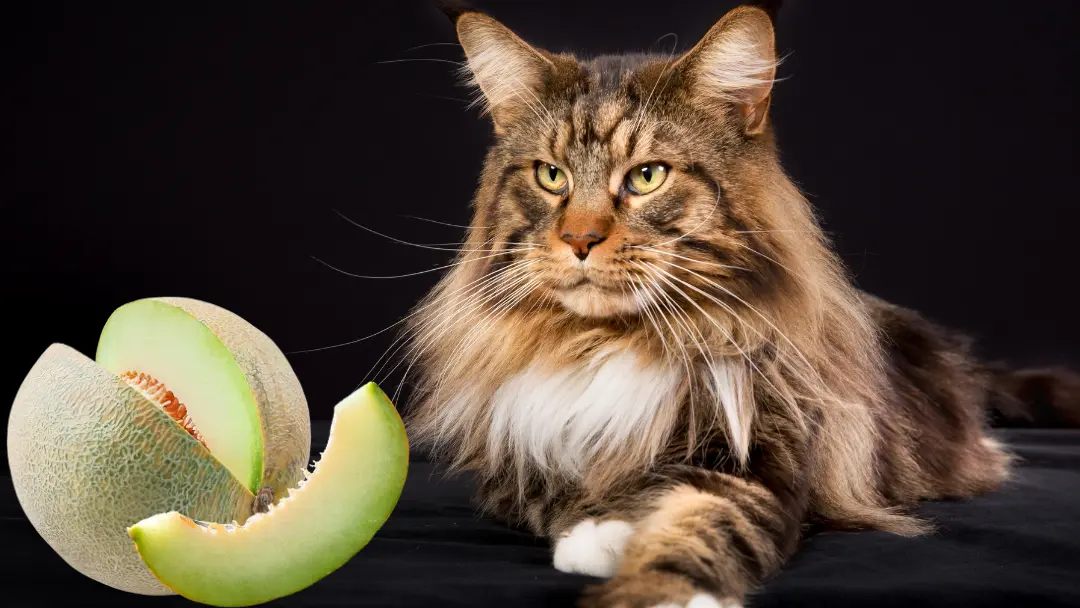
Honeydew melon is one of the safe fruits your cat can eat. As long as you remove the seeds and peel it, honeydew will be an excellent source of hydration. It’s also packed with Vitamin C that will boost your cat’s immune system.
Aside from that, honeydew melon has small amounts of antioxidants that help flush free radicals out of your cat’s body. Free radicals are by-products of the body as it breaks down food. It’s basically waste matter that can make your cat sick if not balanced out.
Removal of free radicals from the body helps in delaying the aging process. So, indirectly, this helps your cat live a longer healthy life.
Moreover, honeydew melon has dietary fiber that helps maintain healthy bowel movements. It also aids weight loss and controls the blood sugar of your cat.
While there are real benefits to eating honeydew, it shouldn’t become a major part of your cat’s diet. In the end, your cat will only get full of honeydew without much-needed nutrition. Honeydew only contains small amounts of vitamins and minerals that can’t compete with the nutrition cat food has.
Also, cats are carnivores, so their digestive system is wired to process meat-based diets. Nevertheless, a small serving of honeydew will not hurt.
Overall, honeydew melon isn’t necessary for cats, but it’s not toxic either. Many cats don’t gravitate toward it either since felines don’t have the ability to taste sweetness.
Can cats eat honeydew melon skin?
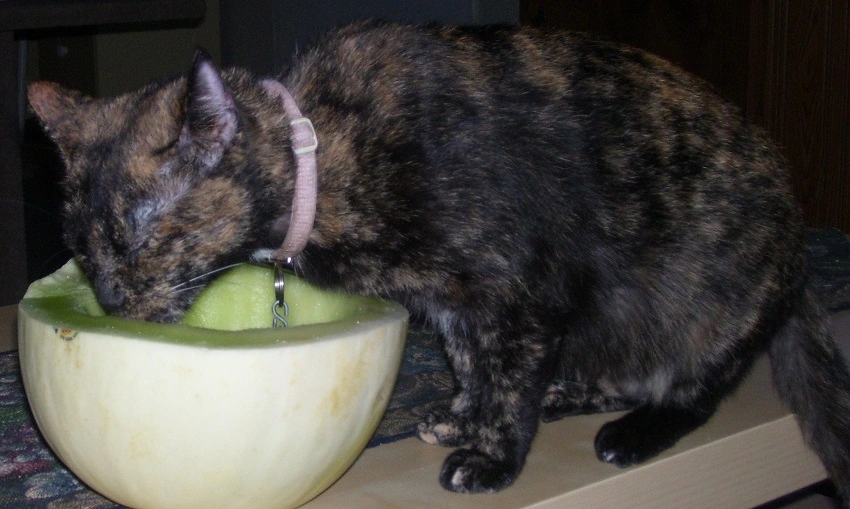
You should always peel honeydew melon before giving it to your cat. Although its rind is smoother than a cantaloupe, honeydew skin is still stiff. Your cat will find it hard to eat. Worse, it can cause blockage and choking that can compromise your kitty’s life.
Aside from removing the skin, you should also scrape the seeds off the honeydew. It’s not toxic, but it can be difficult to digest on your cat’s part. To be on the safe side, you should remove seeds before feeding honeydew to your cat.
Why is my cat obsessed with honeydew?
You’ll never know what food might interest your cat. Some cats don’t like honeydew, while others are crazy about it. Like humans, cats develop different food preferences, which explains the variety of food items they prefer.
Remember that it’s not the sweetness of honeydew that attracts your cat. It’s usually the texture and the moisture on the fruit. Please read here: Why Are Cats Attracted To Roses
Scientists identified that house cats originated from the Fertile Crescent, a semi-arid territory. This is the reason why your house cat is used to not drinking often. They get most of their hydration from food. This explains why cats – including my kitten Watson – is obsessed with juicy fruits.
Another possible reason behind a cat’s love of honeydew is its smell. Cats have a heightened sense of smell, so they perceive honeydew melon’s odor about 14 times stronger than we do.
It turns out that most amino acids in meat are also present in melons like honeydew. Such amino acids are strongly linked to the aroma of a food item. Experts believe that cats might be perceiving the fleshy honeydew as meat.
Despite your cat’s obsession, you should never overindulge them with honeydew. This fruit contains sugars that can risk your kitty’s health. Feeding too much honeydew can lead to the risk of obesity.
Obesity predisposes your cat to various problems such as cardiovascular diseases and diabetes. If your cat is overweight, you should ensure you give adequate exercise to keep it healthy and fit.
Aside from a small amount of Vitamin C, antioxidants, and fiber, there’s not much in honeydew that will be beneficial for cats.
Can cats eat pineapple?
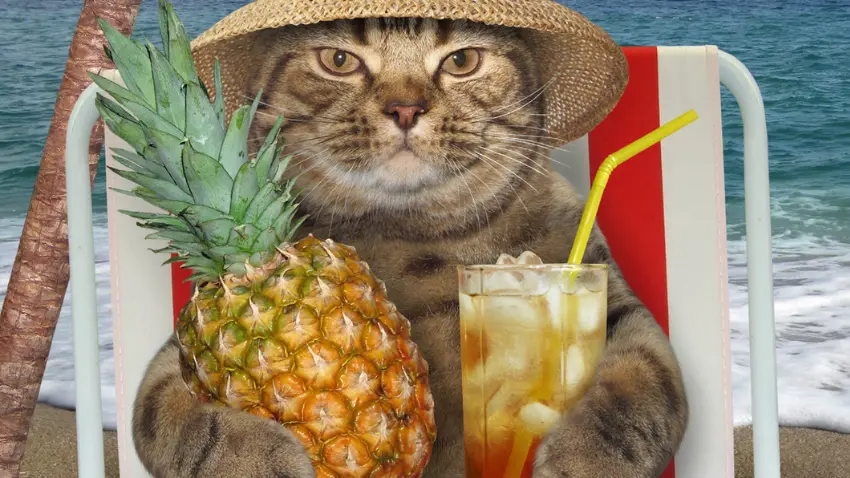
Another juicy fruit that is safe for cats is pineapple. Your cat will not get sick if it ate a small slice of pineapple, but don’t expect the kitty to like it.
Pineapple is a combination of sweet and sour flavors. Since cats can’t detect sweetness, they are left with the sour taste, which many kitties don’t like either. Nevertheless, some cats can develop an affinity to pineapple due to its texture.
But before you offer some pineapple to your cat, be warned that this fruit contains an enzyme called actinidain. I hadn’t heard about this until a co-worker’s cat turned out to be allergic to pineapples.
Actinidain is an enzyme present in fruits like pineapple, kiwi, papaya, and mango. Some cats can develop an allergic reaction to this enzyme, just like how it can be sensitive to other food items.
Nevertheless, if your cat seems to accept pineapple well, a small serving will aid the feline’s digestion.
Can cats eat cantaloupe?
Cantaloupe is similar to honeydew and is often mistakenly interchanged. Nevertheless, cantaloupe is safe for cats, just like honeydew.
A small slice of cantaloupe is an enjoyable treat for cats. However, never give too much of this fruit because it contains lots of sugars that increase your cat’s risk for diabetes.
Like honeydew, cantaloupe is rich in Vitamins A, B, and C. It also contains traces of potassium that are beneficial for your cat’s muscles.
Make sure that you remove the rind of cantaloupe before giving it to your cat. Like honeydew, the stiff rind of cantaloupes can cause choking, blockage, and gastrointestinal upset. The cantaloupe’s skin may also have pesticides that don’t get washed out, no matter how you rinse the fruit.
What other fruits can cats eat?
Aside from honeydew, pineapple, and cantaloupe, there are other fruits that are safe for cats. Still, you should only give the following in small amounts:
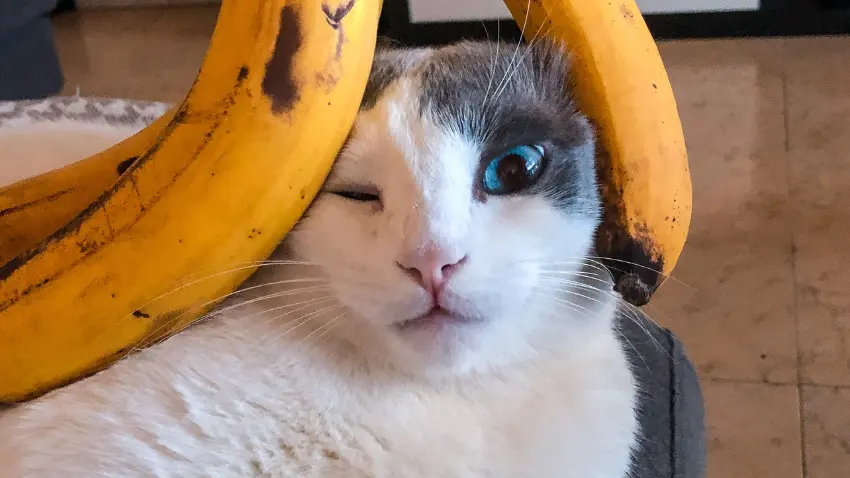
- Banana. One of the most convenient fruits for your cat is bananas. It’s soft and easy to digest. However, cats under some medication may dislike bananas due to the potassium content that has a drug-like smell.
- Watermelon. During summer, chilled watermelon cubes are excellent treats for cats. Just make sure that you remove the seeds and rind to prevent stomach upset.
- Mango. Ripe mangoes offer a dose of Vitamin C for cats. You should dice the mango meat and remove the seed and skin properly so your cat won’t choke on it.
- Peach. Like mango, you should cut the peach meat into small pieces before giving it to your cat. Also, you should remove the peach pit because it’s toxic for cats
- Apple. Apple is crunchy and juicy, which many cats love. Its texture also appeals to felines, but you should remove all the seeds and the pit to prevent choking.
Conclusion
Can cats eat honeydew? Yes, this fruit is safe and refreshing for cats. Still, you should remove the rind and seeds to prevent any irritations or risk of gastrointestinal upset.
Most of all, you should only give a small amount of honeydew to prevent excessive sugar intake on your cat’s part. An excess amount of honeydew can cause gastrointestinal problems. The frequency of feeding honeydew shouldn’t also increase twice a week.
I hope the information from this article will help you add a treat to your cat’s diet.
If you notice any problems, you should contact your vet immediately.
Thank you for reading!
